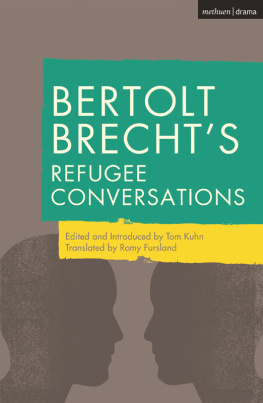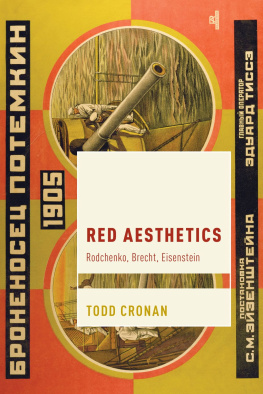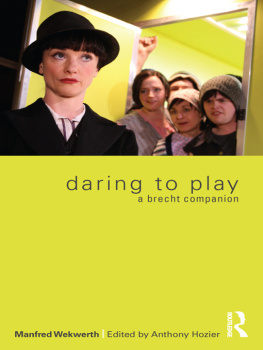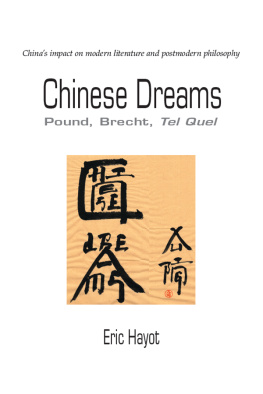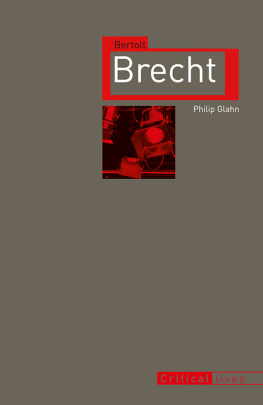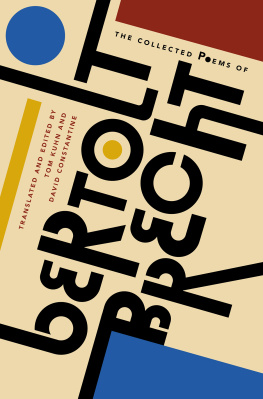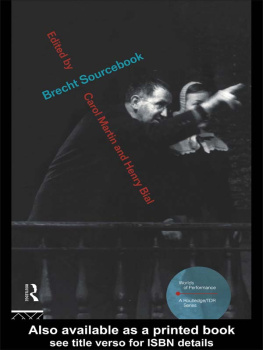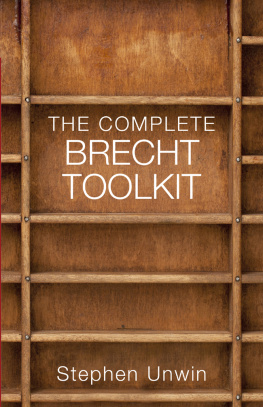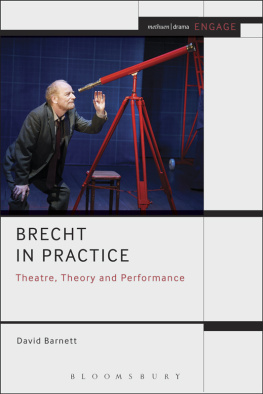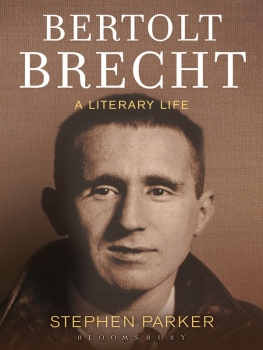Bertolt Brechts
Refugee Conversations
Selected Writings of Bertolt Brecht
Brecht on Art and Politics
Bertolt Brecht and the David Fragments (19191921)
Brecht on Film and Radio
Brecht on Theatre
Brecht on Performance
Collected Short Stories of Bertolt Brecht
Bertolt Brecht Journals 19341955
Brecht and the Writers Workshop
The Business Affairs of Mr Julius Caesar
BERTOLT BRECHTS
REFUGEE CONVERSATIONS
BERTOLT BRECHT
Translated by Romy Fursland
Edited and Introduced by
Tom Kuhn

On 28 February 1933, the day after the Reichstag Fire, Brecht left Germany and became a refugee. Passing through Switzerland and France (neither of them very welcoming to anti-Nazi refugees), he settled first in Denmark, near the little town of Svendborg on the island of Fyn, not far at all from the German coast to the south. After six remarkably productive years, in April 1939, with war on the horizon and having made an application for a visa to enter the United States, the Brecht family moved on to Sweden, where they lived on the island of Liding, outside Stockholm. The European war began in September, and Scandinavia was soon under threat. In the north, Russia and Finland faced each other on a war footing, and by April 1940 German troops had already occupied Denmark and arrived in Norway. In an increasingly jumpy situation, on 9 April Brechts house was raided by the police in search of political material. With still no news of visas that would enable them to leave Europe altogether, the family decided to move on to Finland. In Helsinki the war in the east had led to a serious housing shortage, but they were able to find a small flat, where there was one room each for Brecht, his wife the actress Helene Weigel his loyal collaborator and sometime mistress Margarete Steffin, and a shared room for the two children. Brechts work room, Steffin remarked, was as ever the nicest room of all (Bertolt Brecht-Archiv, E 10/57). In June 1940 German troops advanced through Belgium and Holland to northern France, and encircled the English and French forces at Dunkirk. The occupation of Paris and the fall of France followed swiftly in the same month. In his Journal (14 June 1940) Brecht commented, In the future it will perhaps be difficult to understand the impotence of the peoples in the face of these wars of ours. Recognizing that their escape to America was still not possible, the family moved to the country, to a small house on the estate of the Finnish writer Hella Wuolijoki, some four hours drive north-east of Helsinki. Between here and Helsinki, the Brechts stayed in Finland all the way through to May 1941, when they finally left to embark on the long journey through the Soviet Union to Vladivostok and from there across the Pacific to safety in Santa Monica, California.
The year in Finland was again, given the very fraught circumstances, astonishingly productive for Brecht. Here Brecht wrote a great many poems (especially the so-called Steffin Collection), prepared Mother Courage for its premiere in Zurich (April 1941) and worked at a number of unfinished prose texts, made great progress on and finally completed The Good Person of Szechwan, wrote both Mr Puntila and his Man Matti (with Wuolijoki) and The Resistible Rise of Arturo Ui from scratch, all alongside many other more minor and cultural-theoretical projects (including the Messingkauf). And he wrote most of the Refugee Conversations.
First, probably, came the four monologues about sex, in the tone of Puntila, that were never integrated into the Conversations and which we have included as an appendix to the present edition. Then came what was to become Ziffels memoirs (see especially Conversations 3 and 4). In the autumn of 1940 we have the first signs of the conception of a new and distinct work with the title Flchtlingsgesprche (Refugee Conversations), and the rest of the dialogues follow extremely swiftly as if this was material that had just been parked somewhere in his mind, waiting for the appropriate form. Later, in the first half of 1942 and now in the United States, Brecht developed the Ziffel- and Kalle-script (Conversation 17), and wrote a few extra dialogues and some fragments (that we have included again as an appendix). The dialogues were numbered and paginated, although neither fully nor entirely consistently, and in 1944 they were re-ordered again into a spring-binder. The work was never properly finished, that is clear, and it was not published until shortly after Brechts death, partially in 1957 and 1958 and then more fully in 1961 and in the edition of Brechts collected works (Gesammelte Werke) in 1967. The sex monologues were first published in the Berliner und Frankfurter Ausgabe (BFA) in 1995. We have followed the order of the BFA but numbered the conversations sequentially, not as Brechts manuscripts. We have also included, as an appendix, a series of unfinished texts clearly written for the dialogues or composed in the same spirit. A concordance at the back of this volume indicates the dates of the various parts and the relationship, insofar as the ordering of the texts is concerned, between these standard editions and the present English text. The Notes, which give a little more detail and explain some obscurities, are organized simply by conversation number and placed at the end.
The collected dialogues tell a strange story. At some point early in the Second World War, two men find themselves in the station caf in Helsinkis central railway station. We are never told quite how they come to be there, but they are refugees from Nazi Germany. Here, in relative safety and on the margins of Europe, over an indeterminate span of days, they meet at irregular intervals and talk, or ramble, over a rich array of subjects, from the poor quality of the beer (and the dictators) to the problem of bed-bugs (and other bloodsuckers), all the while mixing their impressions of European politics and the progress of the war with their own life experience before their enforced exile. With bemusement and bitter sarcasm they review the countries through which they have fled. From time to time they rise to quite philosophical heights. One, Ziffel (a surname), is an educated man, middle class and confident in his terms of reference, a physicist (although he also sometimes seems to be a chemist); the other, Kalle (a diminutive of Karl), is working class, with some experience of leftwing politics he seems to have been a metalworker in his previous life in Germany. Both are reduced, by the experience of exile, to the picaresque perspective of the little man, but nonetheless with the differences of their previous experiences. We get to know them well over the course of their conversations.
Brechts Refugee Conversations is in many ways a surprising work. The form is perhaps the first thing to remark upon. Although the work has, long after Brechts death, several times been produced as a two-hander for the theatre, it is clear that the author never thought of these satirical prose dialogues as a play. On the contrary, he had been experimenting with satirical narrative and discursive forms at least since the start of his anti-Nazi exile in 1933, although none of these is well known. First he wrote a series of Unpolitical Letters of satire on contemporary political issues; then, in The Business Affairs of Mr Julius Caesar, he tried a large-scale historical satire in diary form; all the while he was also working on the anecdotal Stories of Mr Keuner
Next page
